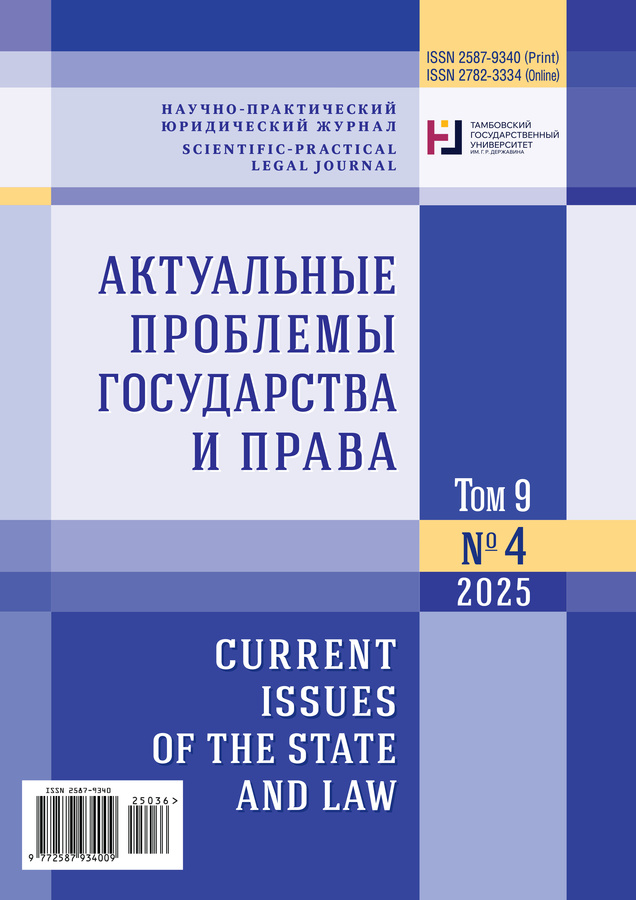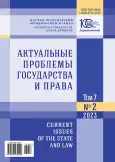Значение психологического портрета в раскрытии неочевидных преступлений
- Авторы: ПОТАПОВ С.А.1
-
Учреждения:
- ФГБОУ ВО «Тамбовский государственный университет им. Г.Р. Державина»
- Выпуск: Том 7, № 2 (2023)
- Страницы: 348-356
- Раздел: Процессуальное право
- URL: https://journal-vniispk.ru/2587-9340/article/view/303496
- ID: 303496
Цитировать
Аннотация
Актуальность статьи обусловлена комплексным исследованием значения психологического портрета, как метода, обеспечивающего раскрытие неочевидных преступлений. Цель статьи – проанализировать понятие и сущность психологического портрета и определить его значимость в решении задач уголовного судопроизводства. Реализация поставленной цели достигается использованием законов диалектики, формальной логики и применением общенаучных и частнонаучных методов исследования. Анализ статистики раскрытия и расследования показывает, что разработка эффективной методики составления портрета неустановленного преступника является актуальной задачей для правоохранительных органов. Исследованы существующие теоретические подходы определения связей между следами преступления и личностью преступника, в частности криминалистический, программно-целевой, психиатрический и психологический. Дана их краткая характеристика. Исследованы понятие и основные цели составления психологического портрета и его значение в раскрытии неочевидных преступлений. Рассмотрена история развития данного метода как за рубежом, так и в России. Сделан сравнительный анализ метода, применяемого за рубежом, в частности в ФБР, и в России, определены имеющиеся в них различия и особенности. Рассмотрено информационное содержание исследуемого метода и методика составления психологического портрета преступника. Сделан вывод, что психологический портрет как не традиционный метод познания и результат составления комплексной характеристики неизвестного преступника имеет определенную значимость в решении задач раскрытия и расследования неочевидных, безмотивных серийных преступлений. При этом он может использоваться в расследовании наравне и в сочетании с другими традиционными способами и средствами.
Об авторах
Сергей Александрович ПОТАПОВ
ФГБОУ ВО «Тамбовский государственный университет им. Г.Р. Державина»
Автор, ответственный за переписку.
Email: potapov.1995@yandex.ru
ORCID iD: 0000-0002-4364-7694
кандидат юридических наук, доцент кафедры уголовного права и процесса Института права и национальной безопасности
Россия, Российская Федерация, 392000, г. Тамбов, ул. Интернациональная, 33Список литературы
- Потапов С.А. Значение криминалистической характеристики преступлений в расследовании неочевидных преступлений // Социально-экономические явления и процессы. 2017. Т. 12. № 4. С. 141-148. https://elibrary.ru/zgzlxj
- Бахин В.П. Диссертационные исследования уже не дают повода для изобретения пороха и бумаги // Ученые записки Таврического национального университета им. В.И. Вернадского. Серия Юридические науки. 2007. Т. 20 (59). № 2. С. 311-317. URL: http://sn-law.cfuv.ru/wpcontent/uploads/ 2016/12/47_bahin.pdf
- Видонов Л.Г. Криминалистические характеристики убийств и системы типовых версий о лицах, совершивших убийство без очевидцев. Горький, 1978. 122 c. URL: http://biblio.crimlib.info/www/read.php?mode=image&id=28&file=39&page=1
- Ларин А.М. Криминалистика и паракриминалистика. М.: БЕК, 1996. 179 c. URL: https://search.rsl.ru/ru/record/01001741203
- Толстолуцкий В.Ю. Использование информационных технологий в раскрытии и расследовании убийств. Н. Новгород: Нижегор. гос. ун-т, 2012. 151 с. URL: http://www.unn.ru/pages/e-library/method-material/files/Tolstolutsky.pdf
- Ахмедшин Р.Л. К вопросу о доказательственном статусе заключения об установлении психологического портрета неизвестного преступника // Проблемы познания в уголовном судопроизводстве: материалы науч.-практ. конф. Иркутск: Изд-во ИГЭА, 2000. С. 91-97. URL: https://search.rsl.ru/ru/record/ 01000671807
- Анфиногенов А.И. Психологическое портретирование неустановленного преступника. М., 2002. 133 c.
- Ахмедшин Р.Л., Кубрак Н.В. Содержание стадий методики построения «психологического портрета» неизвестного преступника // Проблемы познания в уголовном судопроизводстве: материалы научно-практической конференции. Иркутск, Изд-во ИГЭА, 2000. С. 98-105. URL: https://search.rsl.ru/ru/re-cord/01000671807
- Мухин Г.Н., Каразей О.Г., Исютин-Федотков Д.В. Криминалистическое моделирование личности неустановленного преступника и его преступного поведения / под общ. ред. Г.Н. Мухина. М.: Юрлитинформ, 2012. 204 c. URL: https://search.rsl.ru/ru/record/01005434418
- Анфиногенов А.И. Психологический портрет преступника, его разработка в процессе расследования преступления: дис. … канд. психол. наук. М., 1997. 183 c. URL: https://search.rsl.ru/ru/record/01000177494
- Образцов В.А., Богомолова Н.Н. Криминалистическая психология. М.: ЮНИТИ-ДАНА, 2002. 448 c. URL: https://www.studmed.ru/view/obrazcov-va-bogomolova-sn-kriminalisticheskaya-psihologiya_1910430f7f5.html
- Составление психологического портрета преступника / авт.-сост. А.Ю. Лаговский, А.И. Скрыпников, В.Н. Тележникова, Л.А. Бегунова. М.: ВНИИ МВД России, 2000. 113 c. URL: https://rusneb.ru/catalog/010003_000061_0d3c9003afe863c26577689accfbf329/
- Тимофеева А.В. Криминалистическое моделирование неизвестного преступника по признакам и свойствам, отображаемым в следах преступления: автореф. дис. ... канд. юрид. наук. Челябинск, 2010. 27 с. URL: https://viewer.rsl.ru/ru/rsl01004613531?page=1&rotate=0&theme=white
Дополнительные файлы









